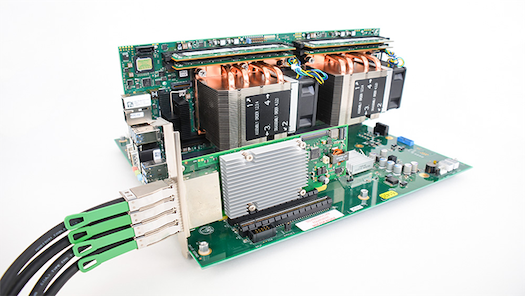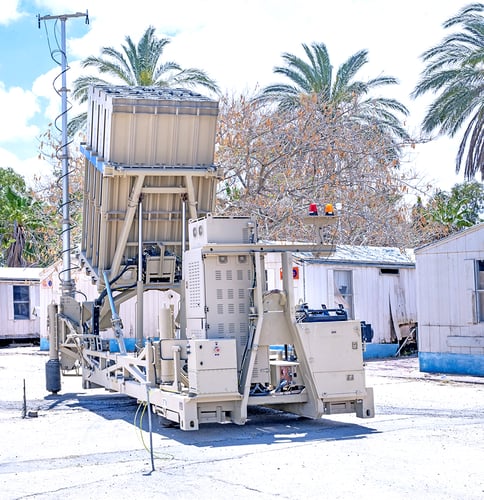Share this
MIL-STD-810 Servers: Enhancing Military Defense with Rugged Computers
by Brett Daniel on May 8, 2020 1:18:04 PM
Note: Trenton Systems is not a compliance testing facility. We manufacture rugged servers and workstations that conform to military and industrial standards, such as MIL-STD-810 and DO-160, and we can ensure that our systems comply with these standards using our in-house testing equipment, or by sending our systems to a third-party compliance testing laboratory for validation, but our facility does not offer compliance testing services for products manufactured outside of Trenton Systems. For a list of laboratories that can assist you with your testing needs, please read this blog post, which lists the best compliance testing laboratories in the world.
Update 05/11/2020: Check out our blog post on MIL-STD-810H to learn more about the standard's newest revision. You can also read our comprehensive MIL-STD-810 overview.
MIL-STD-810 servers are rugged computers capable of operating at peak performance in blood-curdling environments that would render non-certified rugged systems completely inoperable.
-2.png?width=955&name=Social%20Post%20-%20March%202020%20(5)-2.png)
Graphic: Trenton Systems' TMS4711, a MIL-STD-810 Rugged Workstation
These formidable military computers, whether in the form of a rugged rack server, blade server, workstation or mini PC, undergo strict testing and certification to ensure that juddering mechanical shock, heart-sinking vibration, extremely hot and cold temperatures and other computer-killing conditions don’t damage or compromise the very hardware that’s supporting a mission-critical application.
Not only that, they’re often equipped with motherboard-blistering Intel CPUs, application-slicing memory, PCIe expansion kits and enough rugged storage to seamlessly accumulate and process the bulkiest of data chunks generated by the most demanding of resource-intensive tasks.

Photo: A Trenton Systems PCIe Expansion Kit
Situated unobtrusively in server racks and blade enclosures, they’re impressively expandable, upgradable and scalable, designed to be slid open, removed and retrofitted with a nonchalant flick of the wrist. Hot-swappable to their very core, they’re guaranteed to facilitate the continuous operation of mission-critical systems in the event of technical complications.
Hardened, lifelong behemoths of grit, computation and modification, MIL-STD-810-certified servers often act as arbiters between mission success and mission failure in the realm of military defense, the former of which can be the difference between life and death.
When we say that Mil-Spec servers improve or enhance defense initiatives, those aren’t just shallow, meaningless buzzwords. We’re not on the fence about the validity of these claims. We know them to be true because we’ve provided tried-and-true, long-lasting solutions to the very companies and contractors responsible for the eventual success of those programs and applications.
On that note, let’s look at a few use cases for MIL-STD-810 rugged computers and components.
United States Air Force: Drone Trainer
The United States Air Force needed a MIL-STD-810G server with lots of PCI Express slots, high compute capability and the ability to support its pilot desktop training platform for Unmanned Aerial Vehicles (UAVs), also known as drones.
Enter the reliable MIL-STD-810-certified 5000 Series Rugged Server, one of the fastest, most flexible rack mount rugged computers on the market today.
This durable Mil-Spec server features an impressive 14 slots, or 80 lanes, of PCIe 3.0 for any necessary expansion, Intel Xeon Scalable Performance Silver & Gold processors for high-performance computing, plenty of solid state or hard disk drive storage and a lightweight chassis design.
Today, the 5000 Series ensures speed and computational efficiency from behind the scenes of the platform, directly impacting the education of studious pilots as they learn to fly drones, such as the famous MQ-9 Reaper and RQ-4 Global Hawk.

Photo: A Navy aircraft carrier
United States Navy: Command Systems
The United States Navy needed a MIL-STD-810G workstation with support for PCI legacy cards and the ability to pass MIL-S-901 Barge Testing, which involves detonating explosives in water and assessing the resulting high-impact mechanical shock.
The 4000 Series Rugged Workstation is the ideal choice for applications likely to experience extreme shock, vibrations and temperature fluctuations.
MIL-STD-810-certified, the 4000 series can support up to 12 PCIe 3.0 slots, which can utilize PCI legacy cards through backwards compatibility, and includes a Redundant Power Supply Unit, reducing the risk of a complete system shutdown.
Two 4000 Series workstations now monitor the Navy’s jet launch command system aboard the USS Gerald R. Ford (CVN-78).

Photo: The Israel Defense Forces' Iron Dome
Israel Defense Forces: The Iron Dome
The Israel Defense Forces needed a rugged single-board computer and PCIe backplanes to support its mission-critical missile defense system, The Iron Dome, capable of detecting, intercepting and destroying short-range rockets and artillery shells.
The MIL-STD-810-certified Dual Xeon single-board computer, in addition to some stress-tested PCIe backplanes for any future expansion efforts, answered the call.
This combination can operate at peak performance in even the most resource-demanding mission-critical applications and programs.
Today, the IDF’s 200-pound, compute-intensive Iron Dome utilizes the combination to ultimately protect the lives of Israeli civilians and prevent projectiles from devastating critical military areas.
Now, let’s look at an intense scenario in which MIL-STD-810 servers are keeping the ball rolling behind the scenes as a ship endures a drone attack.

Photo: A drone flying over a mountain range
Scenario: Drone Attack
It’s 2 a.m.
Officers on board a naval ship awake to find the vessel under attack by an unidentified drone.
The ship is struck not once, not twice, but three times, sending deafening vibrations throughout the port side.
Ears are ringing.
Fortunately, the ship’s automated weapons systems, powered by hardened MIL-STD-810G-certified servers resistant to mechanical shock, gunfire shock and vibration, blow the UAV out of the sky before it can strike again.
The firing of the weapons sends yet another series of heart-throbbing vibrations throughout the ship.
At last, there is peace. No one on board was hurt, and the ship sustained minor damage.

Graphic: MIL-STD-810 certifications are an absolute must. Download MIL-STD-810H or speak with a specialist today.
Conclusion
Had the rugged servers controlling the ship’s weapons systems not been certified to MIL-STD-810G, the mechanical shock and vibration resulting from the drone strikes could have damaged or destroyed the servers altogether, leaving the ship’s primary defense systems severely impaired and vulnerable.
Furthermore, the gunfire shock from the firing of the ship’s weapons would have damaged or destroyed the very servers powering their computation and analysis, an unfortunate, inadvertent act of mechanical self-destruction.
Scenarios like this one are why it’s critically important to purchase rugged servers that are certified to military standards such as the MIL-STD-810. It’s also why all branches of the military and numerous major industries trust the truly rugged computers of Trenton Systems.
When we say our military and industrial servers are certified to MIL-STD-810, that means they were sent to a third-party testing facility and rigorously, no, meticulously, stress-tested to pass this standard.
Some computer systems are marketed as “rugged,” “ruggedized” or “tested to pass” military standards, but they haven’t actually been certified to the Department of Defense’s requirements by a third-party facility.
Purchasing these feeble, unreliable, unsecured systems can leave your program or application impaired and vulnerable, and why deal with susceptibility and defenselessness when both can be prevented?
Share this
- High-performance computers (42)
- Military computers (38)
- Rugged computers (32)
- Cybersecurity (25)
- Industrial computers (25)
- Military servers (24)
- MIL-SPEC (20)
- Rugged servers (19)
- Press Release (17)
- Industrial servers (16)
- MIL-STD-810 (16)
- 5G Technology (14)
- Intel (13)
- Rack mount servers (12)
- processing (12)
- Computer hardware (11)
- Edge computing (11)
- Rugged workstations (11)
- Made in USA (10)
- Partnerships (9)
- Rugged computing (9)
- Sales, Marketing, and Business Development (9)
- Trenton Systems (9)
- networking (9)
- Peripheral Component Interconnect Express (PCIe) (7)
- Encryption (6)
- Federal Information Processing Standards (FIPS) (6)
- GPUs (6)
- IPU (6)
- Joint All-Domain Command and Control (JADC2) (6)
- Server motherboards (6)
- artificial intelligence (6)
- Computer stress tests (5)
- Cross domain solutions (5)
- Mission-critical servers (5)
- Rugged mini PCs (5)
- AI (4)
- BIOS (4)
- CPU (4)
- Defense (4)
- Military primes (4)
- Mission-critical systems (4)
- Platform Firmware Resilience (PFR) (4)
- Rugged blade servers (4)
- containerization (4)
- data protection (4)
- virtualization (4)
- Counterfeit electronic parts (3)
- DO-160 (3)
- Edge servers (3)
- Firmware (3)
- HPC (3)
- Just a Bunch of Disks (JBOD) (3)
- Leadership (3)
- Navy (3)
- O-RAN (3)
- RAID (3)
- RAM (3)
- Revision control (3)
- Ruggedization (3)
- SATCOM (3)
- Storage servers (3)
- Supply chain (3)
- Tactical Advanced Computer (TAC) (3)
- Wide-temp computers (3)
- computers made in the USA (3)
- data transfer (3)
- deep learning (3)
- embedded computers (3)
- embedded systems (3)
- firmware security (3)
- machine learning (3)
- Automatic test equipment (ATE) (2)
- C6ISR (2)
- COTS (2)
- COVID-19 (2)
- CPUs (2)
- Compliance (2)
- Compute Express Link (CXL) (2)
- Computer networking (2)
- Controlled Unclassified Information (CUI) (2)
- DDR (2)
- DDR4 (2)
- DPU (2)
- Dual CPU motherboards (2)
- EW (2)
- I/O (2)
- Military standards (2)
- NVIDIA (2)
- NVMe SSDs (2)
- PCIe (2)
- PCIe 4.0 (2)
- PCIe 5.0 (2)
- RAN (2)
- SIGINT (2)
- SWaP-C (2)
- Software Guard Extensions (SGX) (2)
- Submarines (2)
- Supply chain security (2)
- TAA compliance (2)
- airborne (2)
- as9100d (2)
- chassis (2)
- data diode (2)
- end-to-end solution (2)
- hardware security (2)
- hardware virtualization (2)
- integrated combat system (2)
- manufacturing reps (2)
- memory (2)
- mission computers (2)
- private 5G (2)
- protection (2)
- secure by design (2)
- small form factor (2)
- software security (2)
- vRAN (2)
- zero trust (2)
- zero trust architecture (2)
- 3U BAM Server (1)
- 4G (1)
- 4U (1)
- 5G Frequencies (1)
- 5G Frequency Bands (1)
- AI/ML/DL (1)
- Access CDS (1)
- Aegis Combat System (1)
- Armed Forces (1)
- Asymmetric encryption (1)
- C-RAN (1)
- COMINT (1)
- Cloud-based CDS (1)
- Coast Guard (1)
- Compliance testing (1)
- Computer life cycle (1)
- Containers (1)
- D-RAN (1)
- DART (1)
- DDR5 (1)
- DMEA (1)
- Data Center Modular Hardware System (DC-MHS) (1)
- Data Plane Development Kit (DPDK) (1)
- Defense Advanced Research Projects (DARP) (1)
- ELINT (1)
- EMI (1)
- EO/IR (1)
- Electromagnetic Interference (1)
- Electronic Warfare (EW) (1)
- FIPS 140-2 (1)
- FIPS 140-3 (1)
- Field Programmable Gate Array (FPGA) (1)
- Ground Control Stations (GCS) (1)
- Hardware-based CDS (1)
- Hybrid CDS (1)
- IES.5G (1)
- ION Mini PC (1)
- IP Ratings (1)
- IPMI (1)
- Industrial Internet of Things (IIoT) (1)
- Industry news (1)
- Integrated Base Defense (IBD) (1)
- LAN ports (1)
- LTE (1)
- Life cycle management (1)
- Lockheed Martin (1)
- MIL-S-901 (1)
- MIL-STD-167-1 (1)
- MIL-STD-461 (1)
- MIL-STD-464 (1)
- MOSA (1)
- Multi-Access Edge Computing (1)
- NASA (1)
- NIC (1)
- NIC Card (1)
- NVMe (1)
- O-RAN compliant (1)
- Oil and Gas (1)
- Open Compute Project (OCP) (1)
- OpenRAN (1)
- P4 (1)
- PCIe card (1)
- PCIe lane (1)
- PCIe slot (1)
- Precision timestamping (1)
- Product life cycle (1)
- ROM (1)
- Raytheon (1)
- Remotely piloted aircraft (RPA) (1)
- Rugged computing glossary (1)
- SEDs (1)
- SIM Card (1)
- Secure boot (1)
- Sensor Open Systems Architecture (SOSA) (1)
- Small form-factor pluggable (SFP) (1)
- Smart Edge (1)
- Smart NIC (1)
- SmartNIC (1)
- Software-based CDS (1)
- Symmetric encryption (1)
- System hardening (1)
- System hardening best practices (1)
- TME (1)
- Tech Partners (1)
- Total Memory Encryption (TME) (1)
- Transfer CDS (1)
- USB ports (1)
- VMEbus International Trade Association (VITA) (1)
- Vertical Lift Consortium (VLC) (1)
- Virtual machines (1)
- What are embedded systems? (1)
- Wired access backhaul (1)
- Wireless access backhaul (1)
- accredidation (1)
- aerospace (1)
- air gaps (1)
- airborne computers (1)
- asteroid (1)
- authentication (1)
- autonomous (1)
- certification (1)
- cognitive software-defined radios (CDRS) (1)
- command and control (C2) (1)
- communications (1)
- cores (1)
- custom (1)
- customer service (1)
- customer support (1)
- data linking (1)
- data recording (1)
- ethernet (1)
- full disk encryption (1)
- hardware monitoring (1)
- heat sink (1)
- hypervisor (1)
- in-house technical support (1)
- input (1)
- integrated edge solution (1)
- international business (1)
- licensed spectrum (1)
- liquid cooling (1)
- mCOTS (1)
- microelectronics (1)
- missile defense (1)
- mixed criticality (1)
- moving (1)
- multi-factor authentication (1)
- network slicing (1)
- neural networks (1)
- new headquarters (1)
- next generation interceptor (1)
- non-volatile memory (1)
- operating system (1)
- output (1)
- outsourced technical support (1)
- post-boot (1)
- pre-boot (1)
- private networks (1)
- public networks (1)
- radio access network (RAN) (1)
- reconnaissance (1)
- rugged memory (1)
- secure flash (1)
- security (1)
- self-encrypting drives (SEDs) (1)
- sff (1)
- software (1)
- software-defined radios (SDRs) (1)
- speeds and feeds (1)
- standalone (1)
- storage (1)
- systems (1)
- tactical wide area networks (1)
- technical support (1)
- technology (1)
- third-party motherboards (1)
- troposcatter communication (1)
- unlicensed spectrum (1)
- volatile memory (1)
- vpx (1)
- zero trust network (1)
- January 2025 (1)
- November 2024 (1)
- October 2024 (1)
- August 2024 (1)
- July 2024 (1)
- May 2024 (1)
- April 2024 (3)
- February 2024 (1)
- November 2023 (1)
- October 2023 (1)
- July 2023 (1)
- June 2023 (3)
- May 2023 (7)
- April 2023 (5)
- March 2023 (7)
- December 2022 (2)
- November 2022 (6)
- October 2022 (7)
- September 2022 (8)
- August 2022 (3)
- July 2022 (4)
- June 2022 (13)
- May 2022 (10)
- April 2022 (4)
- March 2022 (11)
- February 2022 (4)
- January 2022 (4)
- December 2021 (1)
- November 2021 (4)
- September 2021 (2)
- August 2021 (1)
- July 2021 (2)
- June 2021 (3)
- May 2021 (4)
- April 2021 (3)
- March 2021 (3)
- February 2021 (8)
- January 2021 (4)
- December 2020 (5)
- November 2020 (5)
- October 2020 (4)
- September 2020 (4)
- August 2020 (6)
- July 2020 (9)
- June 2020 (11)
- May 2020 (13)
- April 2020 (8)
- February 2020 (1)
- January 2020 (1)
- October 2019 (1)
- August 2019 (2)
- July 2019 (2)
- March 2019 (1)
- January 2019 (2)
- December 2018 (1)
- November 2018 (2)
- October 2018 (5)
- September 2018 (3)
- July 2018 (1)
- April 2018 (2)
- March 2018 (1)
- February 2018 (9)
- January 2018 (27)
- December 2017 (1)
- November 2017 (2)
- October 2017 (3)
/Trenton%20Systems%20Circular%20Logo-3.png?width=50&height=50&name=Trenton%20Systems%20Circular%20Logo-3.png)




No Comments Yet
Let us know what you think